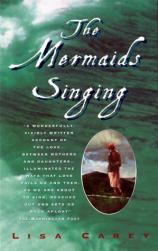Reading Group Guide
Discussion Questions
The Mermaids Singing

1. The names Clíona, Grace, and Graínne are unique and meaningful. To what extent are each of their names appropriate for them? What role does naming play, and how do Clíona and Grace's choices for their daughters reflect their roles at mothers? What does Graínne mean when she refers to her name saying, "It should have been my mother's name, not mine." (p. 161)? What keeps her from accepting her name, and why does she choose to give her mother's name as her own on page 32?
2. When Grace is told the myth at the heart of her mother's name, she says it suits Clíona perfectly because her life was also one of "pitiful and unimaginative subjection to others" (p. 7). But when Graínne hears the same myth years later, her reaction (p. 249) is much different. What does this tell us about Graínne, and what does it promise for her relationship with her grandmother?
3. The search for a place to call home is a powerful element of this novel. Discuss how growing up in the Willoughby home may have affected Grace. Does Graínne, too, lack a home? Do you think she's able to find one at the end of the novel?
4. The island of Inis Murúch is a character in its own right. What is the significance of an island setting, and how does this backdrop affect each character differently?
5. Soon after her mother's death, Graínne stops eating. Why does not eating become so important to her, and how does her slow self-starvation relate to her mother's illness?
6. Graínne is first introduced to the Catholic mass by her grandmother, and she takes a particular interest in the miracle of transubstantiation, the process by which bread and wine become the body and blood of Christ. She recalls the intonation, "This is my body, it will be given up for you" on page 109, and thinks immediately of Stephen. Why?
7. Repetition is another important element in this novel. Graínne repeats Grace's journey to Inis Murúch with Clíona, for instance. What other repetitions are there? Do you think these characters are fated to repeat each other's journeys?
8. When Graínne asks her mother about her background, Grace answers, "You're whatever you want to be. It's not important where you come from. What matters is where you take yourself" (pp. 52-53). Do you think Grace believes this statement wholeheartedly? Is it true for these women?
9. The action of the novel unfolds in a non-linear form, with past and present flowing freely. What does this contribute to the story? How would a more straightforward handling of the sequence of events have altered the reading experience?
10. The image of mermaids is one of the most prevalent in the novel. Grace, in particular, is strongly associated with them. What makes her most mermaid-like and what does the connection reveal about her? Where else does mermaid imagery appear?
11. When Graínne first learns that her grandmother is alive, she isn't willing to accept the truth, claiming, "My mother tells me everything" (p. 12). How does the revelation of Grace's secrets change Graínne's perception of her mother? How do the secrets each woman kept affect her relationship with her daughter? How would their lives have turned out differently if there had been no secrets between them?
12. More than one character literally drowns in THE MERMAIDS SINGING and others feel that they are drowning metaphorically. Why is this such an important theme, and what meaning does it hold for each character?
13. When Seamus tries to embrace her, Grace tells him, "You're holding me too tight" (p. 191). In what ways is the feeling of being trapped important to these characters? Ultimately, Seamus decides to set Grace free, losing his daughter in the process. Do you think Seamus's decision not to pursue his wife and child is a courageous and selfless decision, or a cowardly one?
14. On page 171, Eamon tells Grace, "The O'Flaherty's have got the mermaids on their side, in the odd case God isn't watching." What's the significance of this statement? Do you agree with him?
The Mermaids Singing
- Publication Date: August 29, 2012
- Mass Market Paperback: 352 pages
- Publisher: Avon
- ISBN-10: 038079960X
- ISBN-13: 9780380799602







